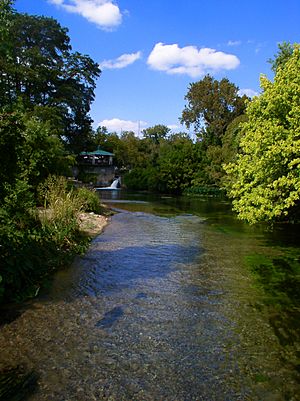San Marcos gambusia facts for kids
Quick facts for kids San Marcos gambusia |
|
|---|---|
| Conservation status | |
| Scientific classification |
The San Marcos gambusia (Gambusia georgei) was a small fish. It belonged to the Poeciliidae family, which includes many live-bearing fish. This fish was only found in the San Marcos Springs in Central Texas. Sadly, no one has seen this fish since 1983. Because of this, it is now considered extinct. The fish was named after a scientist named George S. Myers.
Contents
What the San Marcos Gambusia Looked Like
The San Marcos gambusia was a small fish. It usually grew to be less than 1.6 inches (4 cm) long. Its body was dark, with a slight blue color. The fins in the middle of its body were lemon yellow. Its scales had a strong pattern like a crosshatch. The fin on its back, called the dorsal fin, had a dark stripe along its edge.
Scientists are not exactly sure what this fish ate. However, other fish in the same family usually eat insect larvae. They also eat other small creatures without backbones, called invertebrates. These fish gave birth to live young, not eggs. They could have a few dozen babies at one time.
Where the San Marcos Gambusia Lived
The San Marcos gambusia was only found in a small area. This area was about 0.6 miles (1 km) long. It was located at the very beginning of the San Marcos River. These fish seemed to need very clean and clear water. They also preferred water that did not change temperature much. They liked shallow, calm water. They also liked areas with some shade.
Why the San Marcos Gambusia Disappeared
By 1969, there were fewer than 1,000 San Marcos gambusia left. The fish faced many threats. The amount of water flowing from the springs decreased. There was also pollution, including chemicals sprayed near the river. Other fish, like the Gambusia affinis, were also introduced. New plants, such as Colocasia esculenta, also grew in their habitat.
No San Marcos gambusia have been seen since 1983. Because of this, the species is now considered extinct.
See also
 In Spanish: Gambusia georgei para niños
In Spanish: Gambusia georgei para niños



